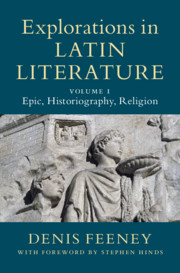Book contents
- Explorations in Latin Literature
- Explorations in Latin Literature
- Copyright page
- Dedication
- Contents
- Foreword
- List of Acknowledgements and Original Places of Publication
- Introduction
- Chapter 1 The Taciturnity of Aeneas
- Chapter 2 The Reconciliations of Juno
- Chapter 3 Epic Hero and Epic Fable
- Chapter 4 Stat magni nominis umbra: Lucan on the Greatness of Pompeius Magnus
- Chapter 5 History and Revelation in Virgil’s Underworld
- Chapter 6 Following after Hercules, in Virgil and Apollonius
- Chapter 7 Beginning Sallust’s Catiline
- Chapter 8 Leaving Dido: The Appearance(s) of Mercury and the Motivations of Aeneas
- Chapter 9 Epic Violence, Epic Order: Killings, Catalogues, and the Role of the Reader in Aeneid 10
- Chapter 10 Mea tempora: Patterning of Time in Ovid’s Metamorphoses
- Chapter 11 Interpreting Sacrificial Ritual in Roman Poetry: Disciplines and their Models
- Chapter 12 Tenui … latens discrimine: Spotting the Differences in Statius’ Achilleid
- Chapter 13 On Not Forgetting the ‘Literatur’ in ‘Literatur und Religion’: Representing the Mythic and the Divine in Roman Historiography
- Chapter 14 Virgil’s Tale of Four Cities: Troy, Carthage, Alexandria and Rome
- Chapter 15 First Similes in Epic
- Chapter 16 Fictions of Citizenship in Livy’s History
- Published Works of Denis Feeney
- Bibliography
- Index locorum
- General Index
Chapter 1 - The Taciturnity of Aeneas
Published online by Cambridge University Press: 05 August 2021
- Explorations in Latin Literature
- Explorations in Latin Literature
- Copyright page
- Dedication
- Contents
- Foreword
- List of Acknowledgements and Original Places of Publication
- Introduction
- Chapter 1 The Taciturnity of Aeneas
- Chapter 2 The Reconciliations of Juno
- Chapter 3 Epic Hero and Epic Fable
- Chapter 4 Stat magni nominis umbra: Lucan on the Greatness of Pompeius Magnus
- Chapter 5 History and Revelation in Virgil’s Underworld
- Chapter 6 Following after Hercules, in Virgil and Apollonius
- Chapter 7 Beginning Sallust’s Catiline
- Chapter 8 Leaving Dido: The Appearance(s) of Mercury and the Motivations of Aeneas
- Chapter 9 Epic Violence, Epic Order: Killings, Catalogues, and the Role of the Reader in Aeneid 10
- Chapter 10 Mea tempora: Patterning of Time in Ovid’s Metamorphoses
- Chapter 11 Interpreting Sacrificial Ritual in Roman Poetry: Disciplines and their Models
- Chapter 12 Tenui … latens discrimine: Spotting the Differences in Statius’ Achilleid
- Chapter 13 On Not Forgetting the ‘Literatur’ in ‘Literatur und Religion’: Representing the Mythic and the Divine in Roman Historiography
- Chapter 14 Virgil’s Tale of Four Cities: Troy, Carthage, Alexandria and Rome
- Chapter 15 First Similes in Epic
- Chapter 16 Fictions of Citizenship in Livy’s History
- Published Works of Denis Feeney
- Bibliography
- Index locorum
- General Index
Summary
An analysis of Aeneas’ departure from Dido in Book 4 of Virgil’s Aeneid, discussing his speech of defence in particular, together with an investigation of the poem’s overall attitude to the use of rhetorical language
- Type
- Chapter
- Information
- Explorations in Latin Literature , pp. 15 - 38Publisher: Cambridge University PressPrint publication year: 2021

